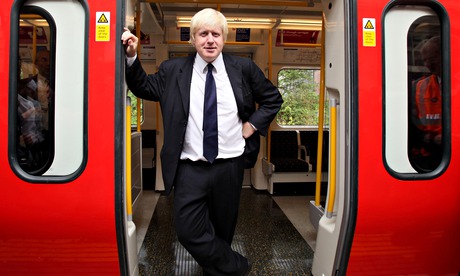
'When Boris Johnson
ran for office in 2008, he opposed the closure of 40 ticket offices by
his predecessor Ken Livingstone.' Photograph: Katie Collins/PA
Over the coming days strike action by London Underground staff
will be characterised in certain quarters as the action of
out-of-control union "barons" intent on "holding the country to ransom".
Last week the rich were threatening to elope if Labour introduced a 5p increase in the top rate of income tax; this week London Underground staff will walk out over a plan to close every single tube ticket office and cut up to 1,000 jobs.
Yet only one of the above will be on the receiving end of vitriol in the press. I'm sure you can hazard a guess as to which one.
Particularly lamentable is the extent to which London mayor Boris Johnson is escaping the scrutiny visited upon those who will be walking out.
In his £250,000-a-year weekly column for the Daily Telegraph, the mayor wrote that, while he did not begrudge Bob Crow his holiday, the Rail Maritime and Transport (RMT) boss was not entitled to "disrupt the lives of millions of people who are not on holiday but who want to work".
"It is absolutely outrageous that London, the motor of the UK economy – now contributing 25% of GDP – should be held to ransom by this tiny minority," he wrote.
The assumption is that it is the union boss, rather than the mayor of London, who is rocking the boat unnecessarily by leading his members on a walkout.
What short memories the mayor and his supporters have.
Whether or not ticket office closures on the London Underground are inevitable, almost no criticism is being levelled at Johnson (I won't call him Boris, because he's not my friend) for pledges made by him while running for mayor in 2008 and then again in 2012.
When Johnson ran for office in 2008, he opposed the closure of 40 ticket offices by his predecessor Ken Livingstone. During that campaign, Johnson even signed a petition calling for London Underground to abandon plans to "drastically reduce the opening hours" of ticket offices.
In his manifesto he also promised to ensure that "there is always a manned ticket office in every station". He repeated this promise again in 2010. And yet today the closure of ticket offices is being billed as something which tube workers should have been expecting all along – despite the fact that the mayor had been saying the opposite for a number of years.
Three quarters (77%) of RMT members who voted in the ballot backed strike action, whereas Johnson won the 2012 mayoral election with 55% of the vote – and many who voted for the mayor did so under the impression that he would not close London Underground ticket offices.
If nothing else, the mayor's giant U-turn is certainly more newsworthy than pictures of Bob Crow sunning himself in Rio de Janeiro.
Last week the rich were threatening to elope if Labour introduced a 5p increase in the top rate of income tax; this week London Underground staff will walk out over a plan to close every single tube ticket office and cut up to 1,000 jobs.
Yet only one of the above will be on the receiving end of vitriol in the press. I'm sure you can hazard a guess as to which one.
Particularly lamentable is the extent to which London mayor Boris Johnson is escaping the scrutiny visited upon those who will be walking out.
In his £250,000-a-year weekly column for the Daily Telegraph, the mayor wrote that, while he did not begrudge Bob Crow his holiday, the Rail Maritime and Transport (RMT) boss was not entitled to "disrupt the lives of millions of people who are not on holiday but who want to work".
"It is absolutely outrageous that London, the motor of the UK economy – now contributing 25% of GDP – should be held to ransom by this tiny minority," he wrote.
The assumption is that it is the union boss, rather than the mayor of London, who is rocking the boat unnecessarily by leading his members on a walkout.
What short memories the mayor and his supporters have.
Whether or not ticket office closures on the London Underground are inevitable, almost no criticism is being levelled at Johnson (I won't call him Boris, because he's not my friend) for pledges made by him while running for mayor in 2008 and then again in 2012.
When Johnson ran for office in 2008, he opposed the closure of 40 ticket offices by his predecessor Ken Livingstone. During that campaign, Johnson even signed a petition calling for London Underground to abandon plans to "drastically reduce the opening hours" of ticket offices.
In his manifesto he also promised to ensure that "there is always a manned ticket office in every station". He repeated this promise again in 2010. And yet today the closure of ticket offices is being billed as something which tube workers should have been expecting all along – despite the fact that the mayor had been saying the opposite for a number of years.
Three quarters (77%) of RMT members who voted in the ballot backed strike action, whereas Johnson won the 2012 mayoral election with 55% of the vote – and many who voted for the mayor did so under the impression that he would not close London Underground ticket offices.
If nothing else, the mayor's giant U-turn is certainly more newsworthy than pictures of Bob Crow sunning himself in Rio de Janeiro.
倫敦市長建議牛津設立撒切爾學院
更新時間 2013年 5月 31日, 星期五 - 格林尼治標準時間11:07

倫敦市長鮑里斯·約翰遜(Boris Johnson)表示,牛津大學應該設立一個以撒切爾夫人(Margaret Thatcher)為名的學院,紀念並彌補當年沒有授予她榮譽博士學位。
1985年,牛津大學學者拒絕授予撒切爾夫人榮譽博士學位,以表達對她的教育政策的不滿。牛津大學對此表示,大學校方目前沒有成立任何新的學院的計劃。
榮譽博士
約翰遜自己也是牛津大學畢業,他在全球大學峰會(Global Universities Summit)上回憶他在牛津的日子。他說,牛津大學當年拒絕授予撒切爾夫人榮譽博士學位,使得撒切爾夫人成為英國二戰後的首相當中,牛津畢業卻沒有被授予牛津榮譽博士的第一人。
「即使撒切爾夫人是牛津畢業的校友,而且是英國第一位女首相,他們還是打破慣例決定不給她榮譽博士學位。」
他說,這一切都是因為「撒切爾夫人修法讓高等教育機構能夠向國際學生收取全額學費。」
國際學生
約翰遜談到這個改變所帶來的利益。「光是去年一年,非歐盟學生為倫敦帶來高達8.7億英鎊的學費,為英國整體經濟所做的貢獻估計更高達80億英鎊。」
撒切爾夫人的母校,牛津大學薩默維爾學院(Somerville College)正計劃進行大規模募款活動,成立撒切爾夫人獎學金。
但是,約翰遜呼籲牛津大學採取更高規格的方式來紀念撒切爾夫人。
沒有留言:
張貼留言